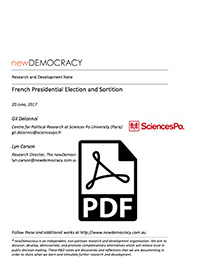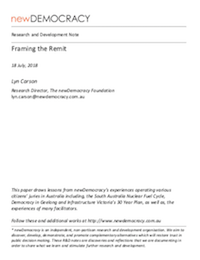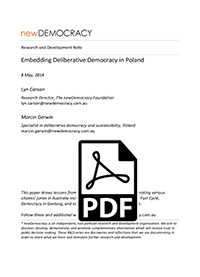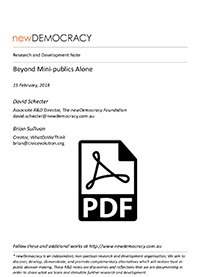Gil Delannoi – Centre for Political Research at Sciences Po University (Paris)
Lyn Carson – Research Director, the newDemocracy Foundation
Presidential campaign
Something rather unusual happened in France during the campaign for president in 2017. Although the world watched with interest as Emmanuel Macron and Martine Le Pen competed in the second round of presidential elections, some fascinating promises were made by candidates in the first round and were largely missed by observers.
The presidential election in France precedes the general election for members of its parliament. France has two parliamentary chambers: the National Assembly and the Senate. The president appoints the prime minister to oversee the government.
It is extremely unusual for aspiring world leaders, or even potential members of parliament, to advocate random selection. Yet, this happened in France in 2017. Some very unusual discourse occurred during the presidential campaign, prior to the first round. This R&D Note examines those unexpected campaign promises.
Prior to campaign
Up until 2017 in France, random selection of public officials and the political use of lottery (sometimes referred to as random selection, other times as sortition) was only put into practice for criminal juries and, on occasion, deliberative panels in local politics. Indeed, not so long ago, contributions from a research team on sortition at Sciences-Po University (Paris), were considered somewhat eccentric, when proposals were published on random selection as a democratic tool (Delannoi et al, 2010). One paper was published by ESPRIT (a French journal) at a time when Emmanuel Macron was on ESPRIT’s review board (Delannoi et al, 2011).
Although it has its roots in Ancient Greece, sortition as a means to strengthen contemporary democracy goes back to the 1980s. Dahl (1989) recommended in passing that selection of representatives by lottery be added to the national representation mechanism. Dahl considered completing the bicameral device in the US Congress with a third chamber, an advisory body selected at random. A few years earlier, Burnheim (an Australian philosopher) had proposed demarchy which is dependent upon on random selection (Burnheim, 1985). In the same year Callenbach and Phillips (1985) proposed a Citizen Legislature in the US. All were largely ignored, except by scholars.
Since the 1980s, proposals for sortition have been more coming thick and fast. For example, Carson and Martin’s Random Selection in Politics (1999) was followed by a flurry of activity in the early 21st century culminating in many very recent publications such as Reybrouck’s Against Elections (2016) and Hennig’s The End of Politicians (2017). Even though scholars and activists have been busy, elected representatives and presidential candidates have been mostly silent on the topic. This changed in 2017. We don’t know how it will end in France, but we can pinpoint when it started.
French presidential election
We can now say that sortition gained momentum in France in 2017 because it was seriously advocated by the main candidates in a national election for the first time. Several candidates proposed the use of lottery as a new political procedure. This novelty, though it may have been secondary to other campaign promises, was one of the many singularities in the election. It is without precedent in France and in the world.
During the campaign the ambitions linked to the introduction of the lottery were very different in nature and degree. In each case, a lack of precision can be noticed in the way that the practices were described. However, the details of the procedure are crucial and proponents of random selection were left hungry to know exactly how the promises would work in practice. For now, we have to be satisfied with one general idea, something that seems to count much more in the eyes of those who conceptualised it, than dealing with any thorny matters of implementation.
The immediate future of these proposals was dependent on the fate of the candidates who suggested them: the first candidate, Arnaud Montebourg, was dismissed in the primaries (there were two primaries which preceded the presidential elections); the second, Jean-Luc Mélenchon, after the first round; and the third, Emmanuel Macron, is now the newly-elected President of the Republic.
For the Senate
French senators are indirectly elected by, mostly, hundreds of regional councillors. It is not a popularly-elected parliament as it is in Australia. Though many approach their role with good intentions, this house has also been labelled at times a ‘refuge’ for those who failed to be elected by French citizens. The Senate is also less powerful than the National Assembly whose representatives are directly elected by voters. The Senate plays a role in the legislative procedure but in case of disagreement (after an official step aimed at compromise), the Assemblée Nationale position will prevail if there is no agreement.
As a result of this, Arnaud Montebourg wanted to entrust random selection to the appointment of a number of Senators. During an interview on a popular radio station, France Inter, in June 2016, Montebourg asked: “Instead of being an institution for people at the end of their career, couldn’t the Senate be a randomly selected assembly with no legislative power since it is not representative but with a controlling role?” A Socialist Party candidate in the primaries, Montebourg proposed that one senatorial seat be randomly selected in each administrative department. The suggested reform follows from Montebourg’s observation that the current Senate is a chamber devoted to uphold unimportant political positions in favour of those who failed the electoral test. Montebourg specifically defined a Senate designated in three thirds: one-third randomly-selected citizens for popular legitimacy, one-third scientists and technical experts extracted from the former Economic and Social Council, and one-third elected by indirect suffrage—the current procedure—in order to maintain territorial representation. This would be a Senate of approximately 300 senators, of which one third would be chosen by lot.
Montebourg was drawing from his own personal experience. He practised a version of this procedure with a Crown jury comprised of nine randomly-selected jurors, admittedly challenged by the Prosecution and Defence. He noted that the jurors always took their role very seriously. While he was elected in the Saône & Loire department, having to face bankruptcy, he set up a committee of randomly-selected citizens meant to monitor the allocation of increased taxes. A jury of 16 members was chosen by lottery from the electoral rolls, for a two-year term with compensation but no salary. This selection was either accepted or refused by those who were ‘elected by lottery’. An initial draw of approximately thirty people enabled the final 16 members. Their report, adopted unanimously, was handed in two years later.
For a Constituent Assembly
Jean-Luc Mélenchon’s project can be described as an historic event but is not empowered to be regular and recurring as it only concerns the designation of a Constituent Assembly. This deliberative body, capable of founding a sixth Republic would include members chosen by lot.
The proposed use of lottery is both ingenious and complicated. It amounts to leaving the choice of the procedure to the voters who could in fact choose between two options at the poll: either vote for a representative or give their vote to the organisation of a lottery. The tallying of the votes would clearly show the number of votes given by the electorate to the lottery and the number of votes supporting the elective vote. Therefore, the procedure would serve in this way as a test for the acceptance of the lottery by the population. Such a consultation would, thus, be acting as a referendum-in-disguise on the use of sortition. For example, suppose that 60% or 70% of the voters give their voice to the lottery, then 60% or 70% of the seats would be allocated through the draw. Consequently, the procedure would be accepted and implemented at the same time by the same vote. If this proportion proved to be too small, for instance 10% or 20%, this would clearly indicate voters’ unwillingness to trial such a procedure; it would be discredited for a while and on such a scale.
This combination may appear a bit tricky. It has, in compensation, the merit of opening the door to lottery without forcing it open whilst handing the key to the people. Of course, such an approach may be unacceptable to opponents of a lottery method. It has the undisputable merit of avoiding a preliminary referendum on lottery before moving on to the practice. For the Constituent Assembly (France’s lower house), the choice of the means would be worthy of a referendum and could be easily justified. This procedure, divided as it is, into two procedural options appears to be in the end more convincing and more convenient in the context of a more local and more limited use.
For accountability
The last proposal, probably the least ambitious, has nevertheless became the most valuable because its proposer, Emmanuel Macron, won 66% of the votes in the second round. It remains to be seen how newly-elected President Macron will actually handle both the random selection of citizens. His proposal is this: each year, the President of the Republic would give accounts to a committee of randomly-selected citizens, the whole procedure being backed up by a report from the French Audit Office enabling citizens to be informed. During the presidential campaign, Macron talked about working on ‘political hygiene’ in order to promote a democratic debate ‘which does not exist nowadays’. In the same spirit, he expressed the wish for establishing an annual gathering with all the parliamentary members assembled in Congress, an event comparable with the annual speech of the President of the United States on The State of the Union.
Macron proposed to talk to two different assemblies, on two different occasions: one would be the French Parliament (National Assembly and Senate, collectively called Congrès) and another day, the procedure of accountability would concern a one-day (or more) Assembly of randomly selected citizens, a body politic that would have been briefed by the “Cour des Comptes”, the “Supreme” court. Both designed to improve state and political accountability in France.
In conclusion
The overlap and coincidence of these proposals is a sign. The future will tell whether it was a flash in the pan meant only to dazzle the curious. The current and multiple references to the lottery—even at levels not huge or formalised or detailed—leads us to believe it was not. These examples speak in favour of the lottery in a more serious way, politically, than the use of lotteries in other areas. Sortition has been used, for example, for social housing in China, for university entrance in The Netherlands, for allocation of the ‘green card’ in the US. If it is possible to replace university entrance exams with the drawing by lot for university students who are seeking admission to a medical degree (a method that exists in several countries), then the above proposals are not so improbable. If there is a field where proficiency tests are more justified than lottery, it is well and truly education—yet sortition exists there when the number of qualified students exceeds the number of available places (Boyle, 2010). Given the democratic deficit which exists, the use of sortition would surely help to overcome rising levels of distrust in politicians [LINK to Pollinate survey].
For the moment, every experiment is worth trying: at the local, regional or national level, and in whatever way is appropriate, particularly in combination with better deliberation (See, Deliberation), representation, and genuine engagement with citizens. If France is any indication, these ideas have finally moved beyond the interests of scholars and advocates; some serious interest has emerged in involving willing citizens in procedural arrangements.
Postscript
These proposals must be differentiated from the use of lottery as an instrument in campaigns and programs. The Citizen Council of 40 people randomly selected among several thousands of applications to ‘enrich the project’ of Benoît Hamon (another presidential candidate) have not been included here for two reasons: firstly, because it was used within a framework more partisan than national, and secondly and more importantly because its procedure, kept partly opaque, showed a way of using quotas which modified profoundly, even erased almost completely, the impartial logic of lottery. The latter is essential: independence and transparency of method when a lottery is used (Lubensky & Carson, 2013).
References
Boyle, C. (2010) Lotteries for Education, Imprint Academic
Burnheim, J. (1985) Is Democracy Possible? The alternative to electoral democracy, Cambridge, Polity Press
Callenbach, E. & Phillips, M. (1985) A Citizen Legislature, Banyan Tree Books
Carson, L. & Martin, B. (1999) Random Selection in Politics, Praeger
Dahl, R. A. (1989) Democracy and its Critics, Yale University Press
Delannoi, G., Dowlen, O., Goodwin B. and Vergne, A. (2011) “le Tirage au sort: pour des choix démocratiques”, ESPRIT (August/September)
Delannoi, G. and Dowlen, O. (2010) Sortition. Theory and Practice, Imprint Academic
Hennig, B. (2017) The End of Politicians. Time for a Real Democracy, Unbound publishers
Lubensky, R. & Carson, L. (2013) ‘Choose Me: The Challenges of National Random Selection’, in Carson, L., Gastil, J., Hartz-Karp, J., & Lubensky, R. (Eds) The Australian Citizens’ Parliament and the future of deliberative democracy. University Park, PA: Pennsylvania State University Press, pp. 204-217.
Van Reybrouck, D. (2016) Against Elections. The Case for Democracy, London, The Bodley Head
* newDemocracy is an independent, non-partisan research and development organisation. We aim to discover, develop, demonstrate, and promote complementary alternatives which will restore trust in public decision making. These R&D notes are discoveries and reflections that we are documenting in order to share what we learn and stimulate further research and development.




